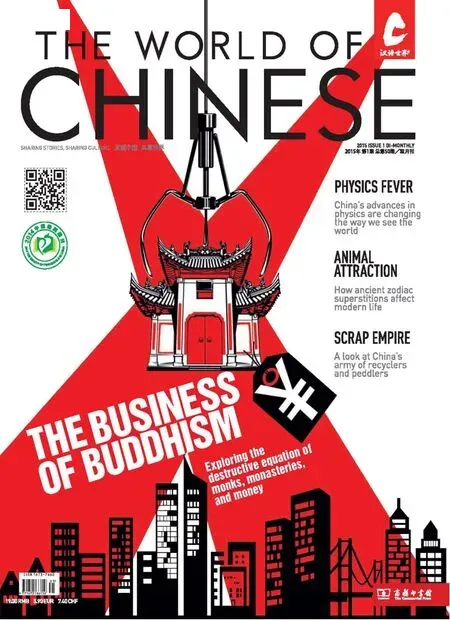MISHMASH
MISHMASH
TOP GRADE CHICKEN
Quantifying the deliciousness of braised chicken would seem to be a tall order, but when faced with this seemingly insurmountable task, one Shanxi doctoral student provided more than enough food for thought.
The student, Sun Lingxia, prepared an 80,000 word report on the dish in an effort to find out how spices affect the taste of meat. The focus was on methods of standardization, and according to The Wall Street Journal, the report focused on star anise, a particularly popular spice in pork and chicken dishes in China.

A board at Shanxi Normal University approved the project, saying it would contribute to food science, and one professor has pointed out that these kinds of papers are not unusual, citing Japanese research into bread.
In fact, the professors are so enthused by the project that one has even asked Sun to conduct further research into salt and other ingredients. Then again, maybe they just really like chicken. - DAVID DAWSON
SPARE SOME CHANGE?
Bank tellers in Jilin Province perfected the art of the raised eyebrow in December, 2014, when some poor guy, who had been paid 50,000 RMB in 1 RMB coins, attempted to make a deposit.
The man had apparently been owed 100,000 RMB, but the company agreed to pay him immediately if they could pay him in coins. He couldn’t carry that many coins and eventually settled for 60,000. Only 50,000 was in coins, the remaining 10,000 wasn’t a whole lot better—all one yuan notes.
When he fronted up to the banks with his treasure, some told him to go to hell. Eventually one agreed to take the 10,000 RMB in notes, and three staff members spent two hours counting it. Unsurprisingly, when confronted with the request to count the coins, they too told him no way.
In the end he found an ICBC bank willing to take the 300 kilograms of coins.
Funnily enough, this isn’t the only time this happened that month. Early in December, a woman showed up with a truck at a bank in Chongqing, with 100,000 RMB in coins. - D.D.
UNDERCOVER CON
A man in his 50s reportedly approached a freshman student in November, 2014 at the Huazhong University of Science in Wuhan, Hubei Province, claiming to be from the Ministry of State Security—roughly equivalent to the US’s NSA.
According to a report in the China Youth Daily, he explained that he was on “official duty” and asked the young woman to pretend to be his daughter, stating that his identity was to be kept in absolute secrecy.
As he spoke into an earpiece with a “teammate”, he told the woman that the criminal he was hunting was in critical condition in hospital. When they arrived at the hospital, in what should have prompted alarm bells after an already suspicious story, he explained that a cash drop had been delayed and that he needed 2,000 RMB from her.

Ever the good citizen, she agreed and helped him out. He explained that the criminal would be released from hospital and that they would use him as bait, but they would need to rendezvous at a nearby hotel. After registering for a room with the woman’s ID, they went to the room, and he then said they had to pretend to be lovers, of course, to dispel suspicion from the dastardly foes who were supposedly monitoring the room. This, apparently, was taking things a little too far. The woman refused, left the “spy” to his fate, and alerted the university, which then issued a notice warning other students of these kinds of scams. Fake spies, as it happens, are even less trustworthy than real ones. - LIU JUE (刘珏)
STONE FEAST
They are heavier than stamps, but they’re much easier to find; rocks in many ways are an ideal item to collect. They come in many forms, some rare, some common, and some look tasty, apparently.
Note the use of the phrase“look” because that’s an important distinction at the Stone Feast in Guangdong Province. On December 12, 2014, the feast took place and consisted of 31 “dishes”. All had been carved from stone. The dishes included lychees, pork ribs, lamb, fried sticky rice dough, beef pies, to name just a few, all made of stones that had not been artificially processed except for being carved.
While it may be a bit weird to feel hungry over some rocks, it would appear people do feel something at these exhibitions. A similar event took place two months earlier in Xi’an, where 108 stone dishes went on display. And you don’t need to eat them to have health problems; the price of a single dish might give you a heart attack. It’s 8,000 RMB for a slice of “pork” or 50,000 RMB for some stone stewed fish. It’s hardly earthshattering news though—one of the most famous sculptures in the Forbidden City is a jade cabbage. - GINGER HUANG (黄原竟)
HAMMER BROS: CAN’T TOUCH THIS
In the course of a single week in December, 2014, police in Hangzhou, Zhejiang Province, received reports of several victims who had been robbed by two men wielding hammers. The victims were strangely evasive. Instead of providing a concise account of the crimes, they stuttered, stammered, and avoided questions.
Alas, they had been robbed of not just cash, but sweet lovin’ as well.
The robbers, dubbed the“hammer bros” by police, found a spot near a make-out point, where eager lovers smooched and more in their cars.
Of course, on learning their favorite spot to strike, the police caught them pretty fast. Apparently they hadn’t been at the game long but had hit upon a pretty good way of ensuring vague accounts from victims.
“We were sure that the couples we robbed would not defy us or report it to police,” they said. The police asked how they came up with the idea. One replied, somewhat bluntly, “That’s how it goes in TV shows.” - G.H.

